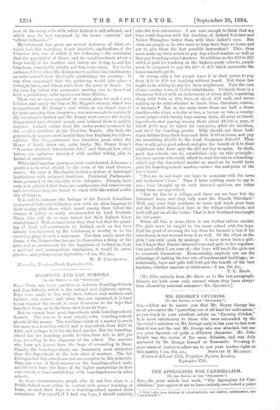BOARDING AND DAY SCHOOLS.
TO THE EDITOR OF THE "SPECTATOR.']
Sie,—There can be no question, as between Boarding-Schools and Day-Schools, which is the natural and righteous system. Boys were made to live with their fathers and mothers and brothers and sisters ; and when they are separated, it is hard to say whether the result is more disastrous to the boys that lose their home, or to the home that loses its boys.
But we.cannot have good day-schools while boardink-schools flourish. The reason is very simple,—the boarding-schools absorb all the money. The teaching salary of a master is much the same in a boarding-schcol and a day-school, from £250 to £400, and perhaps la500 for the head master. But the boarding- school has the boarding profits besides, from £20 to £50 per boy, according to the character of the school. The masters who have not houses have the hope of succeeding to them. Clearly, the boarding-schools are immensely more attractive than the day-schools to the best class of masters. The few distinguished day-schools are not an exception to this principle. They pay some of their masters on the boarding-school scale, and the rest have the hope of the higher masterships in their own school, or head-masterships with boarding-houses in other schools. • In these circumstances, people who do not live close to a Public School must either be content with poorer teaching at home, or send their boys to a boarding-school against their conscience. For myself, if I had any boys, I should certainly take the first alternative. I am vain enough to think that my boys could dispense with the teaching of Ireland Scholars and Senior Wranglers better than with their father's care. But what are people to do who want to keep their boys at home, and yet to give them the best possible instruction? This : they must make up their minds to pay day-school masters as well as they pay boarding-school masters. In addition to the £12 to £20 which is paid for teaching at the highest-grade schools, people must be prepared to pay the £20 or £30 which represents the house-master's profit.
Of course, only a few people have it in their power to pay from £30 to £50 for teaching without board. But those few ought to be willing to pay for their neighbours. Take the case of any country town of 15,000 inhabitants. Probably there is a Grammar School with an endowment of about £150, vegetating along with forty or fifty boys, at about 110 each, and never- making up its mind whether to teach them literature, science, or business.* But in the same town there are half a dozen families—the vicar, a doctor or two, a lawyer or two, a county- court judge—with twenty boys among them, all away at board- ing-schools, and paying among them about £1,500 a year, of which £500 may be taken for cost-price, £400 for teaching, and £000 for boarding profits. Why should. not these half- dozen fathers keep their boys and their £500 at home, and pay the remaining £1,000 to the local Grammar School ? Then they would get a good school, and give the benefit of it to their neighbours who have only the £10 per boy to spare. In short, good day-schools can be established only on this principle: let every parent who could afford to send his son to a boarding- school, pay the day-school master as much as he would have paid the boarding-school master,—minus the cost-price of the boy's board.
" Butave do not want our boys to associate with the town and tradesmen's boys." Then I have nothing more to say to you ; boys brought up to such immoral opinions are better away from our day-school.
"But we live in a village, and there are no boys but the labourers' boys, and they only want the Fourth Standard." Well, pay your high graduate to come and teach your boys and the Fourth-Standard boys in the village schoolroom, and both will get on all the better. That is how Scotland was taught for 300 years.
When all this is done, there is one further reform needed..
The girls must be taught in the same school with the boys. Half the good of rescuing the boy from his barrack is lost if his schoolroom is not rescued from it as well. Of the effect on the girls I can only speak by analogy. I have never been a girl; but I know that Nature intended boys and girls to live together. One good effect I am sure of,—the boys will teach the girls not to overwork themselves. Economically, anybody can see the advantage of uniting the two sets of teachers and buildings; in- tellectually, boys and girls will both get the benefit of the best teachers, whether masters or mistresses.—I am, Sir, &c.,
T. C. Snow.
[We differ entirely from Mr. Snow as to the last paragraph. Schools for both sexes only succeed where they have always been allowed by national manners.—En. Spectator.]


































 Previous page
Previous page